More and more ecotourism initiatives are launched in Laos. We have a proverb in France « petit poisson deviendra grand » (literally « little fish will grow big »), a beautiful metaphor to speak about the environmental issues. Think big but start small and little by little, you will sow the seeds of change.
In Vang Vieng, I had the chance to see the initiatives of Rachel Dechaineux and her husband Somphan. She is from Australia, he is from Laos and they are highly dedicated to ecotourism. They own two hotels: Elephant Crossing Hotel, Silver Naga Hotel, with another currently under construction. They run side projects such as a Pony Trekking, Yoga classes and the Cafe EhEh. They are really attentive to their environmental impact and have plenty of little initiatives. And all these little things, put together will make the difference.
Recycling, waste, renewable energy
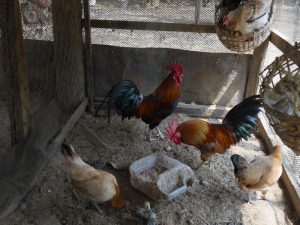 In every location, they collect the plastic and sell it to a recycling company. They also reduce the use of plastic by refilling the flacon for the shampoo and soap in each room, rather than throwing away hardly-used bottles. The small farm and the pony stable are a good example of what can be done with natural and recycling products. I had the chance to meet Sarah Grauer, who explains me a lot of things about the pony stable and its functioning.
In every location, they collect the plastic and sell it to a recycling company. They also reduce the use of plastic by refilling the flacon for the shampoo and soap in each room, rather than throwing away hardly-used bottles. The small farm and the pony stable are a good example of what can be done with natural and recycling products. I had the chance to meet Sarah Grauer, who explains me a lot of things about the pony stable and its functioning.
Concerning the food, they feed animals of the farm with food that would otherwise be thrown away from the hotel restaurants. The food is sorted into three different categories for chicken, pigs and ponies.
An other great idea was to install solar panels to provide hot water in both hotels, a renewable and sustainable option over electricity or other combustible fuels.
Local products and local staff
They employ local staff and the farm is managed by a Lao family. This helps keep communities directly involved with ecotourism and the development of their lands, allowing a higher standard of living and rewarding experience.
At the farm, they cultivate their own vegetables and rice. The rice is used to feed the staff and during the low season, the staff is reemployed in the field to take care of the plantation. Priority is given to local producers when additional foods need to be purchased, and remains mindful about fruit’s and vegetable’s season.
For the products used in the hotels and cafe, they also try to promote local handicraft to give work lao families and also keep the tradition thriving (for example, the use of handwoven bamboo rubbish bins in all rooms). It’s the same for the products they sell – they propose natural products (Les Artisans Lao) and they also support sustainable projects such as the Lao Disabled Womens Development Centre in Vientiane. At the cafe, you can find some original objects made by disabled women, which provides their only source of income.
Awareness : education is king
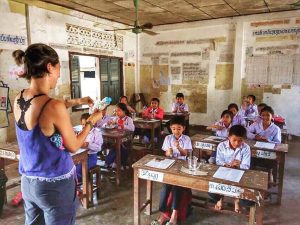
Reducing environmental impact is all about education, right? In addition to training the staff about sustainable methods, they raise awareness among the children in the local community. It’s a vital measure because the future generation will have an important role to play, and if they are familiarized when they are young, later they will be able to have a real impact on their society. Staff visit local schools and explain to the children about the importance of keeping the environment clean. They raise awareness among children not to throw plastic or paper on the ground, and to collect it. Once a week, for one bag full of plastic, the children can get a free ride on the pony. It’s a good way to educate and make them realize how beautiful their country is, and that it’s worthy of protecting.
With a Canadian volunteer, they also had a beautiful project and made a lovely painting on the mall that lead to the Elephant Crossing Hotel. The children took part in the painting while being aware of the environment issues : the importance of the river, of the fish, the disaster of plastic for animals and nature. The children made the fish with plastic bottle and helped with the painting itself. It’s a beautiful example of what can be done with children using art and creativity to speak about serious problem.
They try to be the more sustainable they can in all the way possible. All those initiatives show that tourism and ecology can go together. So please, give to the little fish the possibility to grow big :).
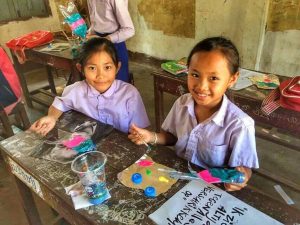
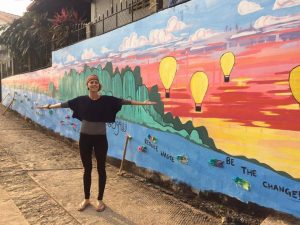
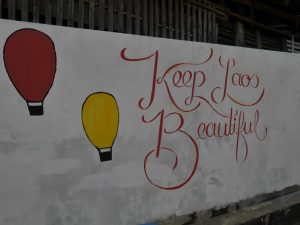
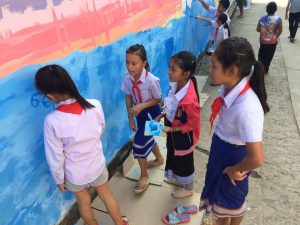
Lead by example… It seems that Rachel and her husband Somphan try to be an example of ecotourism ! When you realized that we are all connected and all part of an ecosystem, you take care of your neighbourhood. Congratulations to them ! A new destination to discover. You can look at the project Birmanie Responsable which promote ecotourism in Birmanie.
http://www.birmanieresponsable.com/
[…] à travers de nombreuses petites actions. Pour en savoir plus, n’hésitez pas consulter cet article sur l’ensemble de leurs […]